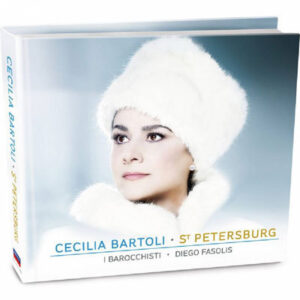Love her or not, Cecilia Bartoli has done it again. You can argue with her breathy production, her “shotgun” approach to fast coloratura, and other so-called tics, but she undoubtedly is the most musically curious mezzo of our (and probably any other) generation.
Having previously introduced many of us to the operatic music of Vivaldi, the sacrifices of the castrati and their remarkable music, much of it composed by little known composers, on this CD she travels to St Petersburg for music composed between 1730 and 1796. Under the Tsaritsas Anna, Elizabeth, and Catherine the Great, “Italian” opera came to Russia, and became all the rage—for a while. It inexplicably fell out of fashion—even after the great castrato Carestini had come to perform—until Glinka’s A Life for the Tsar in 1836, when the Russians created their own, nationalistic idiom.
It’s fun to imagine Bartoli and her minions crawling through manuscripts in the basement of the Mariinsky Theater and finding unheard-for-centuries arias by Cimarosa; Manfredini (not the better-known Francesco, but his son Vincenzo); Domenico dall’Oglio and Luigi Madonis (known, if at all, as violinists); Francesco Araia (a Neapolitan who became court composer when Nicola Porpora turned the job down), whose opera La forza dell’amore e dell’odio was the first compete opera to be performed at the Winter Palace, albeit in Italian (with printed Russian libretto); and the even more mysterious Hermann Raupach, a German who took over Araia’s position in 1759 and who composed an opera to a Russian text.
I recommend that listeners to this CD—and there should be tons of them—begin at the beginning and listen to a gentle lament (from Araia’s opera, mentioned above) sung by Minerva as she goes to her death willingly, as sentenced by her father, and then continue with one in Russian, by Raupach, sung by Hercules (from the opera Alceste) as he faces the jaws of hell. The accompaniment—a full complement of wild strings, trumpets, and timpani—is astonishing, and the vocal line is 18th-century madness at its best.
These two arias show Bartoli at her best: the way that she colors her voice in the first, singing with long, musical legato, and the maniacal rage and cascades of notes in the second, are inimitable. It seems that now, in her late 40s, Bartoli has finally dropped all of her bad habits—and the recording engineers are no longer interested in allowing us to hear her lungs, lips, and tongue.
And so the CD continues: of particular note are a lovely flute-and-archlute-accompanied piece by dall’Oglio and Madonis meant for an opera by Hasse, and one by Manfredini from his opera Carlo Magno, which takes the hero through grief and fury and back again, with both exclamation and fiorature galore. The gorgeous violin and oboe obbligatos that run around Cimarosa’s “Agitata in ogni pene” (with an unexpected “b” section) are seconded only by Bartoli’s remarkable singing—warm middle tones, abundant trills, and attention to every word. The CD ends with a brief chorus (!) from Carlo Magno sung with verve by the Swiss Radio-Television chorus.
Diego Fasolis’ I Barocchisti are at their most expressive, virtuosic, and sensitive. The packaging, as usual, is stunning: three essays, one on each of the Monarchs, plus background information and courtly intrigue (yes, even a discussion of Catherine’s supposed habits in the boudoir), handsome paintings and photographs, texts and translations. And Bartoli at her best, which is a lot.
































